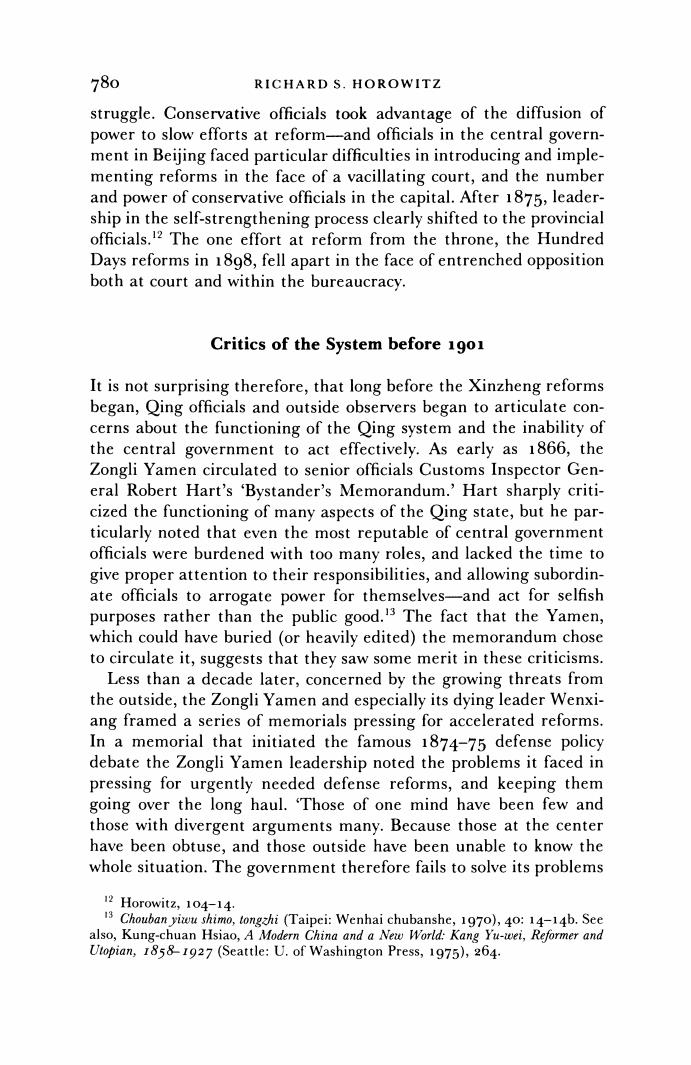正在加载图片...

78o RICHARD S.HOROWITZ struggle.Conservative officials took advantage of the diffusion of power to slow efforts at reform-and officials in the central govern- ment in Beijing faced particular difficulties in introducing and imple- menting reforms in the face of a vacillating court,and the number and power of conservative officials in the capital.After 1875,leader- ship in the self-strengthening process clearly shifted to the provincial officials.2 The one effort at reform from the throne,the Hundred Days reforms in 1898,fell apart in the face of entrenched opposition both at court and within the bureaucracy. Critics of the System before 1901 It is not surprising therefore,that long before the Xinzheng reforms began,Qing officials and outside observers began to articulate con- cerns about the functioning of the Qing system and the inability of the central government to act effectively.As early as 1866,the Zongli Yamen circulated to senior officials Customs Inspector Gen- eral Robert Hart's Bystander's Memorandum.'Hart sharply criti- cized the functioning of many aspects of the Qing state,but he par- ticularly noted that even the most reputable of central government officials were burdened with too many roles,and lacked the time to give proper attention to their responsibilities,and allowing subordin- ate officials to arrogate power for themselves-and act for selfish purposes rather than the public good.13 The fact that the Yamen, which could have buried (or heavily edited)the memorandum chose to circulate it,suggests that they saw some merit in these criticisms. Less than a decade later,concerned by the growing threats from the outside,the Zongli Yamen and especially its dying leader Wenxi- ang framed a series of memorials pressing for accelerated reforms. In a memorial that initiated the famous 1874-75 defense policy debate the Zongli Yamen leadership noted the problems it faced in pressing for urgently needed defense reforms,and keeping them going over the long haul.Those of one mind have been few and those with divergent arguments many.Because those at the center have been obtuse,and those outside have been unable to know the whole situation.The government therefore fails to solve its problems 12 Horowitz,104-14. 3Chouban yiwu shimo,tongzhi (Taipei:Wenhai chubanshe,1970),40:14-14b.See also,Kung-chuan Hsiao,A Modern China and a New World:Kang Yu-wei,Reformer and Utopian,1858-1927(Seattle:U.of Washington Press,1975),264.780 RICHARD S. HOROWITZ struggle. Conservative officials took advantage of the diffusion of power to slow efforts at reform-and officials in the central government in Beijing faced particular difficulties in introducing and implementing reforms in the face of a vacillating court, and the number and power of conservative officials in the capital. After 1875, leadership in the self-strengthening process clearly shifted to the provincial officials." The one effort at reform from the throne, the Hundred Days reforms in 1898, fell apart in the face of entrenched opposition both at court and within the bureaucracy. Critics of the System before 19go1 It is not surprising therefore, that long before the Xinzheng reforms began, Qing officials and outside observers began to articulate concerns about the functioning of the Qing system and the inability of the central government to act effectively. As early as 1866, the Zongli Yamen circulated to senior officials Customs Inspector General Robert Hart's 'Bystander's Memorandum.' Hart sharply criticized the functioning of many aspects of the Qing state, but he particularly noted that even the most reputable of central government officials were burdened with too many roles, and lacked the time to give proper attention to their responsibilities, and allowing subordinate officials to arrogate power for themselves-and act for selfish purposes rather than the public good.'3 The fact that the Yamen, which could have buried (or heavily edited) the memorandum chose to circulate it, suggests that they saw some merit in these criticisms. Less than a decade later, concerned by the growing threats from the outside, the Zongli Yamen and especially its dying leader Wenxiang framed a series of memorials pressing for accelerated reforms. In a memorial that initiated the famous 1874-75 defense policy debate the Zongli Yamen leadership noted the problems it faced in pressing for urgently needed defense reforms, and keeping them going over the long haul. 'Those of one mind have been few and those with divergent arguments many. Because those at the center have been obtuse, and those outside have been unable to know the whole situation. The government therefore fails to solve its problems 12 Horowitz, 104-14. 13 Choubanyiwu shimo, tongzhi (Taipei: Wenhai chubanshe, 1970), 40: 14-14b. See also, Kung-chuan Hsiao, A Modern China and a New World: Kang Yu-wei, Reformer and Utopian, I858-I927 (Seattle: U. of Washington Press, 1975), 264